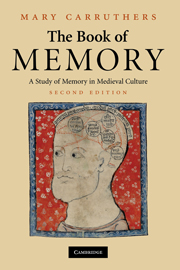Book contents
- Frontmatter
- Contents
- List of Illustrations
- Preface to the second edition
- List of Abbreviations
- Introduction
- CHAPTER 1 Models for the memory
- CHAPTER 2 Descriptions of the neuropsychology of memory
- CHAPTER 3 Elementary memory design
- CHAPTER 4 The arts of memory
- CHAPTER 5 Memory and the ethics of reading
- CHAPTER 6 Memory and authority
- CHAPTER 7 Memory and the book
- Appendix A
- Appendix B
- Appendix C
- Notes
- Bibliography
- Index of manuscripts
- General Index
Introduction
Published online by Cambridge University Press: 05 January 2014
- Frontmatter
- Contents
- List of Illustrations
- Preface to the second edition
- List of Abbreviations
- Introduction
- CHAPTER 1 Models for the memory
- CHAPTER 2 Descriptions of the neuropsychology of memory
- CHAPTER 3 Elementary memory design
- CHAPTER 4 The arts of memory
- CHAPTER 5 Memory and the ethics of reading
- CHAPTER 6 Memory and authority
- CHAPTER 7 Memory and the book
- Appendix A
- Appendix B
- Appendix C
- Notes
- Bibliography
- Index of manuscripts
- General Index
Summary
When we think of our highest creative power, we think invariably of the imagination. “Great imagination, profound intuition,” we say: this is our highest accolade for intellectual achievement, even in the sciences. The memory, in contrast, is devoid of intellect: just memorization, not real thought or true learning. At best, for us, memory is a kind of photographic film, exposed (we imply) by an amateur and developed by a duffer, and so marred by scratches and inaccurate light-values.
We make such judgments (even those of us who are hard scientists) because we have been formed in a post-Romantic, post-Freudian world, in which imagination has been identified with a mental unconscious of great, even dangerous, creative power. Consequently, when they look at the Middle Ages, modern scholars are often disappointed by the apparently lowly, working-day status accorded to imagination in medieval psychology – a sort of draught-horse of the sensitive soul, not even given intellectual status. Ancient and medieval people reserved their awe for memory. Their greatest geniuses they describe as people of superior memories, they boast unashamedly of their prowess in that faculty, and they regard it as a mark of superior moral character as well as intellect.
- Type
- Chapter
- Information
- The Book of MemoryA Study of Memory in Medieval Culture, pp. 1 - 17Publisher: Cambridge University PressPrint publication year: 2008



